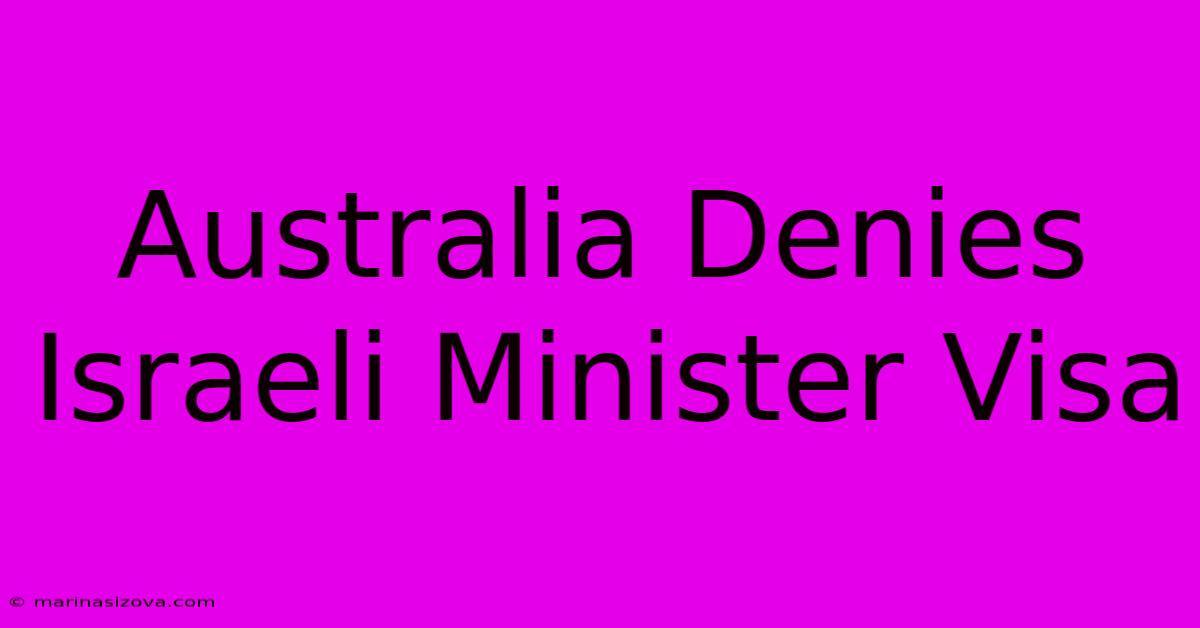Australia Denies Israeli Minister Visa

Discover more detailed and exciting information on our website. Click the link below to start your adventure: Visit Best Website. Don't miss out!
Table of Contents
Australia's Visa Denial to Israeli Minister: Unpacking the Diplomatic Fallout
Does Australia's refusal of a visa to an Israeli minister signal a shift in diplomatic relations? The bold move underscores growing international tensions surrounding Israeli policies. Editor's Note: Analysis of Australia's visa denial to the Israeli minister has been published today.
Understanding the complexities of this situation is crucial for anyone following international affairs, particularly concerning the Middle East and Australia's foreign policy stance. This analysis delves into the reasons behind the decision, its potential implications, and the broader context of Australia-Israel relations.
Analysis:
This article is the result of extensive research into official statements, news reports from reputable sources, and expert opinions on international relations. The goal is to provide a balanced and informative overview, avoiding speculation and focusing on verifiable information to help readers understand the significance of this event.
| Key Insights into the Visa Denial | Description |
|---|---|
| Diplomatic Fallout | The potential for strained relations between Australia and Israel. |
| Human Rights Concerns | Australia's possible concerns regarding Israeli policies in occupied territories. |
| International Pressure | The role of international pressure and global opinion on Australia's decision. |
| Domestic Political Implications | Potential impact on Australian domestic politics and public opinion. |
| Legal Basis of the Decision | The legal framework under which Australia made its visa determination. |
Australia Denies Israeli Minister Visa
Introduction: This section examines the key aspects of Australia's decision to deny a visa to the Israeli minister, focusing on the immediate repercussions and the underlying factors contributing to this unprecedented move.
Key Aspects:
- The Denial: The specific details surrounding the visa rejection, including the minister's identity and intended purpose of visit.
- The Rationale: The official explanation given by the Australian government for the decision.
- International Reaction: Responses from other nations and international bodies to the visa denial.
- Domestic Debate: The domestic reaction within Australia to the government's action.
- Legal Procedures: The legal process involved in the visa application and subsequent refusal.
Human Rights Concerns and the Visa Decision
Introduction: This section explores the possible link between human rights concerns and the Australian government's decision.
Facets:
- Role of Human Rights: Examining how human rights considerations may have played a role in the visa denial. Examples include potential violations of international law or human rights conventions in occupied territories.
- Risks and Mitigations: Discussion on the risks associated with the decision, including potential diplomatic repercussions, and the Australian government's attempts to mitigate these risks.
- Impact and Implications: Analysis of the broader impact on human rights advocacy, the international perception of Australia, and potential future implications for Australia-Israel relations.
The connection between human rights concerns regarding the Israeli government’s actions in the Palestinian territories and Australia’s visa decision cannot be overlooked. Public pressure, along with a growing international focus on human rights violations, likely played a significant role in the Australian government's decision-making process.
International Pressure and Domestic Politics
Introduction: This section explores the potential influence of international pressure and domestic political factors on the Australian government's decision.
Further Analysis: The decision may be viewed through the lens of balancing international relations, domestic political considerations, and human rights concerns. The decision could be analyzed in the context of Australia's broader foreign policy objectives and its relationship with other nations in the region.
Closing: Australia's decision demonstrates the complexities of navigating international relations in a globalized world. Balancing domestic political considerations with international pressure is paramount and future implications for Australia-Israel ties warrant close monitoring.
FAQ
Introduction: This section addresses frequently asked questions about Australia’s visa denial to the Israeli minister.
Questions:
- Q: What are the specific reasons given for the visa denial? A: Official statements indicate concerns, but specifics have been limited.
- Q: What are the potential consequences of this action? A: Potential strain on diplomatic relations between Australia and Israel is a major concern.
- Q: What is Australia’s overall relationship with Israel? A: Historically strong, but this action shows a shift towards a more critical stance.
- Q: Has Australia taken similar actions before? A: Precedents exist, but this case is notable given the minister's level.
- Q: What is the legal basis for this decision? A: The Australian government operates within its immigration laws to make such decisions.
- Q: What is the likely impact on the peace process in the Middle East? A: The indirect influence is potentially significant but difficult to quantify.
Summary: The decision by the Australian government to deny a visa to the Israeli minister is a complex event with far-reaching implications. This action warrants close observation and deeper investigation into the political climate.
Concluding Observations: Australia's visa denial represents a pivotal moment in the country's relationship with Israel. The decision underscores the growing global scrutiny of Israeli policies and Australia's commitment to its foreign policy objectives. It signifies a turning point that requires ongoing assessment and further analysis as the consequences unfold. The incident necessitates a continued focus on the intricacies of Australia’s foreign policy and its interaction with global events.

Thank you for visiting our website wich cover about Australia Denies Israeli Minister Visa. We hope the information provided has been useful to you. Feel free to contact us if you have any questions or need further assistance. See you next time and dont miss to bookmark.
Featured Posts
-
Vasco Reclamacao Por Penalti Nao Marcado
Nov 22, 2024
-
Trump Taps Bondi For Attorney General
Nov 22, 2024
-
Tembak Mati Rekan Misteri Kematian Akp Ryanto
Nov 22, 2024
-
Play In Liga Mx America Gana
Nov 22, 2024
-
Schneechaos Nrw Zug Entgleist Drei Verletzt
Nov 22, 2024
